|
||||||||
|
|
|
2017-04-03 ArtNo.45976
◆Review:The baptism of the Holy Spirit (One’s own teacher)
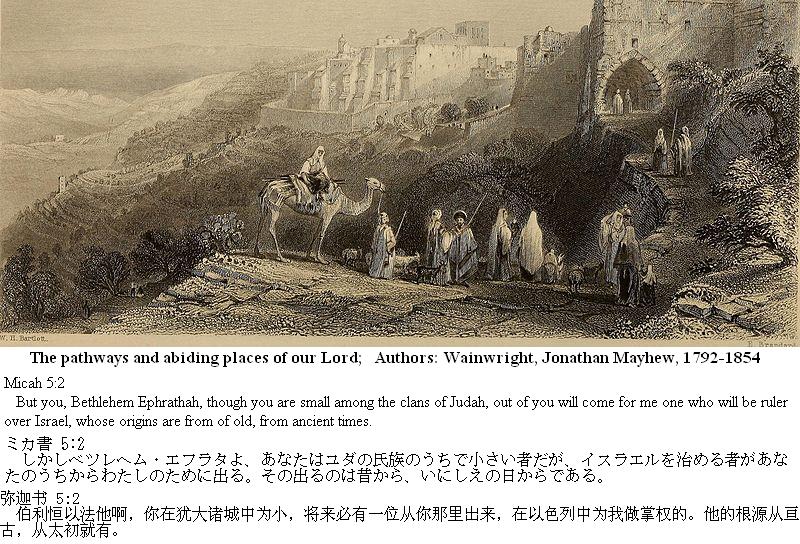 Joseph travelled from Nazareth in Galilee south toward Bethlehem Ephrata with his betrothed Mary in her ninth month for a census of the entire Roman world which had been ordered by Caesar Augustus. Every person had to return to the city from which his family came for the census. Joseph had to go the Bethlehem Ephrata because he was of David's family. (Luke 2:1-5) ○A child of injustice Bethlehem was a walled city where the wealthy people lived. Some of the biblical characters that lived in the city of Bethlehem included Naomi, Boaz, Jesse, and Rehoboam. By contrast, Ephrata was a lowly farm community that grew food and raised sheep and goats for the city of Bethlehem and for the Temple. David's father and brothers lived in the City of Bethlehem but David was born and grew up in the Bethlehem Ephrata. 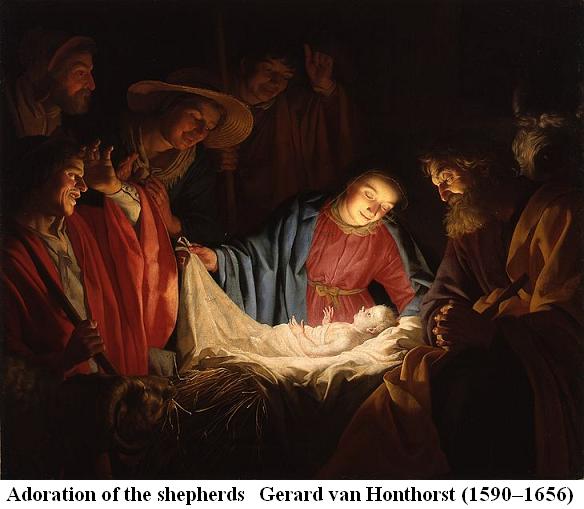 Thus Jesus was also born in Bethlehem Ephrata. (Luke 2:6) However, Joseph who had finished registering the census, for some reason did not return to Galilee, but travelled with Mary and the newborn, Jesus, to Egypt. (Mat 2:14) It may be mentioned that the fact that Mary had become pregnant caused some scandal in Nazareth, that is, the rumors that Joseph was not the one who had impregnated her, but that her pregnancy had been the result of an affair with another man. However, the Gospel of Matthew refers to the following legend; King Herod, the ruler of Judea, who had heard of a prophecy that the Messiah was to be born, ordered to slaughter all male sons, under the age of two. (Mat 2:16) By the way, although David's father Jesse had a lawful wife called Nitzevet bat Adael, the name of David's mother is not in record and Psalms (Psalm 69) implies that David was a child of injustice. Perhaps Jesse had another house outside the city and kept his mistress in it. David seems to have had been born and raised under his own mother. If so, it seems to be no doubt that David belonged to the tribe of Judah. In contrast to it, if Jesus' father was not Joseph, the generally accepted idea that Jesus belongs to David's bloodline will become groundless. ○The Escape to Egypt Anyway, why did Joseph choose Egypt as a place of refuge for them? According to Mr. Shlomo Sand, Professor of history at Tel Aviv University, the Jewish population in Palestine was only about 800 thousand in the 1st century. In contrast to it, the Jewish population in the world was about 4 million. And big communities of Jewish believers seem to have been formed in Alexandria and Cyrene of North Africa much earlier. The numbers of gentile believers increased dramatically and Ecclesias (churches for the non-circumcision gentile believers, who could not formally attend Synagogue) were formed in many places around the Mediterranean. Alexandria seems to have been the hub of these Gentile Jews. Although when Jesus made a debut to the religious society of Jerusalem with testimony of John the Baptist in Bethany (John 1:28), he was about thirty years old according to the Gospel of.Luke (Luke 3:23), there is no record regarding where Jesus had been or what he had been doing until then. 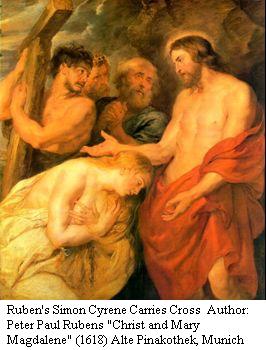 Joseph returned to Nazareth and finally married Mary after staying in Egypt for a few years. However, Joseph might have left Jesus in Egypt just as Jesse let David stay outside the city of Bethlehem until the son grew up. Therefore, Jesus, during he grew up in Egypt, might have determined to take on the role of leader of the gentile church movement and to be crucified in Jerusalem as a savior not only for Israelis but also people in the world. If so, the questions, such as where Jesus had been and what he had been doing before he suddenly appeared alone on the banks of the Jordan River and was baptized by John the Baptist (Mark 1:9/ Mat 3:13/ Luke 3:21), can be solved and it is no wonder that on the day of the Crucifixion, a man called Simon, who had taken his sons, Alexander and Rufus, and come to Jerusalem from all the way from Cyrene in North Africa, carried the cross to Golgotha on behalf of Jesus. (Mark 15:21/Mat 27:32/Luke 23:26) ○John the Baptist and the sect of Simonians 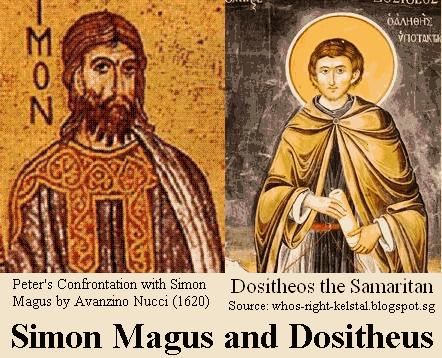 While Jesus borrowed a few disciples from John the Baptist and started his missionary work, latter's other disciples also seem to have joined Jesus' missionary work after the death of John the Baptist. (John 10:40-42) According to so called "Clementine literature," a series of documents written by perhaps multiple authors in the name of Pope Clement I, John the Baptist had thirty leading disciples. The first and most esteemed by John was Simon. But on the death of John he was away in Egypt and one Dositheus succeeded in installing himself as head of the sect. After Simon's coming back, Dositheus asked him, "Tell me if thou art the Standing One, that I may adore thee." And when Simon answered that he was, then Dositheus, perceiving that he himself was not the Standing One, fell down and worshipped him, and gave up his own place as chief to Simon, ordering all the rank of thirty men to obey him; himself taking the inferior place which Simon formerly occupied. Then the sect of Simonians was established. Simon was a Samaritan, and a native of Gitta. He studied Greek literature in Alexandria, and, having in addition to this great power in magic, became so ambitious that he wished to be considered a highest power, higher even than the God who created the world. And sometimes he "darkly hinted" that he himself was Christ, calling himself the Standing One. Which name he used to indicate that he would stand for ever, and had no cause in him for bodily decay. He did not believe that the God who created the world was the highest, nor that the dead would rise. He denied Jerusalem, and introduced Mount Gerizim in its stead. In place of the Christ of the Christians he proclaimed himself; and the Law he allegorized in accordance with his own preconceptions. He did indeed preach righteousness and judgment to come. ○Simonism and Pauline Theology 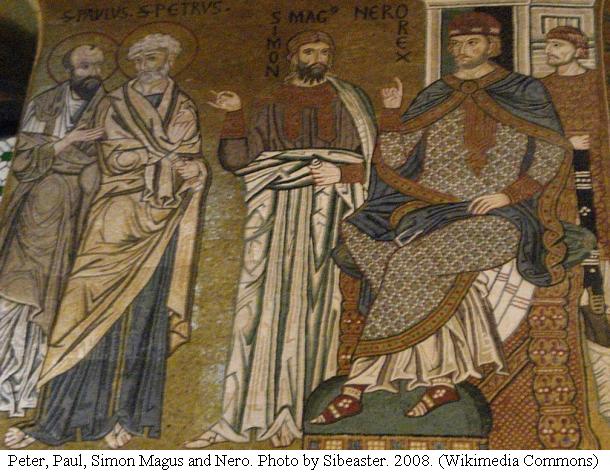 Simon Magus, who had tried to join the church movement and asked to give him status of the Apostle just as St. Paul but had been refused by St. Peter (Acts 8:9-24), is said to have come up to Rome later and have been appointed by Emperor Nero as his religious adviser. It seems that the status of apostle requested by Simon apparently refers to the authority to perform ceremonies to baptize new comers with the Holy Spirit. He himself joined the Church movement under the leadership of The Jerusalem Church through being baptized with water by Philip, one of the Hellenist leaders expelled outside of Jerusalem city after the Stephen incident. The authority to baptize with the Holy Spirit was only given to the Twelve Apostles at that time. Apart from the Twelve Apostles, it seems that only St. Paul and St. Barnabas were later admitted to exercise this authority. In his book, Apologies, Justin Martyr (100? - 162?) says, "He performed such signs by magic acts during the reign of Claudius that he was regarded as a god and honored with a statue on the island in the Tiber which the two bridges cross, with the inscription Simoni Deo Sancto, 'To Simon the Holy God'" (Apologia, XXVI). Epiphanius of Salamis also makes Simon speak in the first person in several places in his Panarion, "... for men were saved according to his grace, but not according to just works. For works were not just by nature, but only by convention, in accordance with the enactments of the world-creating angels, who by precepts of this kind sought to bring men into slavery." This passage is somewhat reminiscent of the dogma of "justification by one's faith" which forms a core of Pauline Theology. According to Epiphanius, Simon taught that both the Law and the prophets were not of God, but of "the sinister power. Thus it was spiritual death to believe in the Old Testament. Yet, Jesus says, "God is spirit, and his worshipers must worship in spirit and in truth."(John 4:24) And St. Paul also says in his letter to his followers, "But people who aren't spiritual can't receive these truths from God's Spirit. It all sounds foolish to them and they can't understand it, for only those who are spiritual can understand what the Spirit means."(1 Corinthians 2:14) Ferdinand Christian Baur (1792–1860), founder of the Tübingen School, drew attention to the anti-Pauline characteristic in the Pseudo-Clementines, and pointed out that in the disputations between Simon and Peter, some of the claims Simon is represented as making (e.g. that of having seen the Lord, though not in his lifetime, yet subsequently in vision) were really the claims of Paul; and urged that Peter's refutation of Simon was in some places intended as a polemic against Paul. The enmity between Peter and Simon is clearly shown. Simon's magical powers are juxtaposed with Peter's powers in order to express Peter's authority over Simon through the power of prayer, and in the 17th Homily, the identification of Paul with Simon Magus is effected. Simon is there made to maintain that he has a better knowledge of the mind of Jesus than the disciples, who had seen and conversed with Jesus in person. His reason for this strange assertion is that visions are superior to waking reality, as divine is superior to human. Peter has much to say in reply to this, but the passage which mainly concerns us is as follows: ○Peter's criticism against Pauline Theology 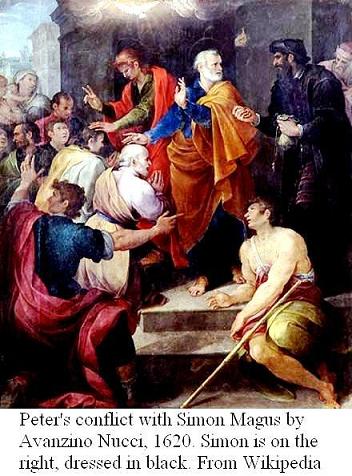 But can any one be educated for teaching by vision? And if you shall say, "It is possible," why did the Teacher remain and converse with waking men for a whole year? And how can we believe you even as to the fact that he appeared to you? And how can he have appeared to you seeing that your sentiments are opposed to his teaching? But if you were seen and taught by him for a single hour, and so became an apostle, then preach his words, expound his meaning, love his apostles, fight not with me who had converse with him. For it is against a solid rock, the foundation-stone of the Church, that you have opposed yourself in opposing me. If you were not an adversary, you would not be slandering me and reviling the preaching that is given through me, in order that, as I heard myself in person from the Lord, when I speak I may not be believed, as though forsooth it were I who was condemned and I who was reprobate. Or, if you call me condemned, you are accusing God who revealed the Christ to me, and are inveighing against Him who called me blessed on the ground of the revelation. But if indeed you truly wish to work along with the truth, learn first from us what we learnt from Him, and when you have become a disciple of truth, become our fellow-workman. Recently, Berlin pastor Hermann Detering (1995) has made the case that the veiled anti-Pauline stance of the Pseudo-Clementines has historical roots, that the Acts 8 encounter between Simon the magician and Peter is itself based on the conflict between Peter and Paul. Detering's belief has not found general support among scholars, but Robert M. Price argues much the same case in The Amazing Colossal Apostle: The Search for the Historical Paul (2012). (Extract from English Wiki) ○No gratitude to the 'Four Graces' and the 'Three Existences' 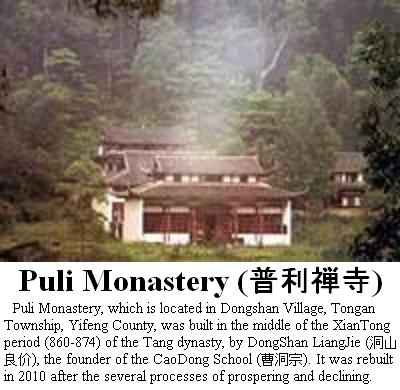 By the end of DaZhong period (847-859) of the Tang dynasty, Chan Master DongShan LiangJie received disciples and taught them at the XinFeng Mountain. After that his teachings were wide-spread at DongShan in GaoAn of YuZhang (Present northern area of Yinfeng County in Jiangxi Province). One day, when the Master was conducting the annual memorial service for Master YunYan, a monk asked him: "What instruction did you receive from the late Master YunYan?" "Although I was there with him, he gave me no instruction." answered the Master. "Then why should you conduct the memorial service for him, if he did not instruct you?" further asked the monk. "Although this was the case, how could I disobey him?" explained the Master. "You became known after you visited NanQuan. Why should you conduct the memorial service for YunYan?" pressed the monk. "It is neither for his moral character, nor for his teaching of Dharma that I respect him. What I consider to be important is that he never openly told me anything." stated the Master. The monk then asked him: "Master! you conduct a memorial service for the late Master YunYan. Do you agree or disagree with what he has said to you?" "Half agree and half not!" replied the Master. "Why don't you entirely agree with him?" continued the monk. "If I entirely agreed with him, it would be ungrateful to him." replied the Master. A monk asked: "How can I see your original master?" "If two people both reach the ultimate, then there is no barrier of age between them." answered the Master. The monk tried asking about what still puzzled him. The Master said to him: "Do not trace the previous steps, but raise another question." The monk made no answer. YunJu, another disciple, replied for him: "According to what you say, I cannot see your original master." The Master then continued: "Is there any one who does not show his gratitude to the 'Four Graces (Heaven/ Earth/ Lord/ Parents)' and the 'Three Existences (Intelligences / Destiny/ Animateness)'." If he does not understand the meaning of these, how can he be free from the suffering of the beginning and ending of existence. Every thought he has in his mind should be free from attachment to things, and also every step he takes should be free from attachment to his dwelling place. When he keeps on in such a way without interruption, he will be close to the answer." ("The Transmission of the Lamp, Chapter 15" translated by Chang Chung-Yuan)<To be continued> 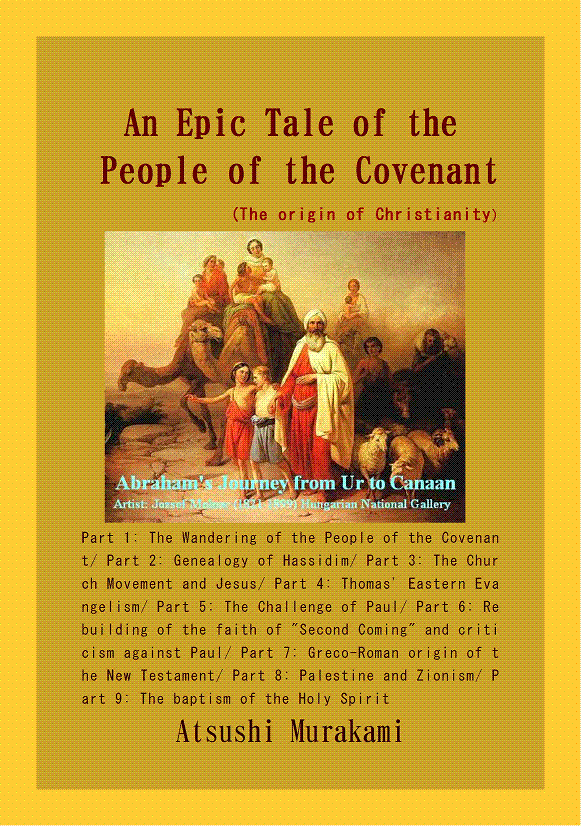 ○What is "Baptism with The Holy Spirit"? According to the dialectic of the Gospel of John, 【Thesis】"A man can possess eternal life through accepting testimony of the Son of man and being baptized by him." (John 5:24) 【Anti-thesis】But "The one who comes from the earth cannot accept the testimony by one from heaven."(John 3:32) How then can a man possess eternal life? 【Synthesis】"If you want to be baptized with the Holy Spirit, you can just go back to the word which was with God in the beginning (John 1:1) and certify that God is truthful. (John 3:33)" When he said, "You are Huichao," Zen Master Fayan thrusted vivid Self in Huichao in front of his eyes. Purchase here ○One world:The aim of SEAnews Your Comments / UnsubscribeSEAnewsFacebookSEAnewsGoogleSEAnews eBookstoreSEAnews eBookstore(GoogleJ)SEAnews world circulation |
|
[Your Comments / Unsubscribe]/[您的意见/退订]/[ご意見/配信停止]
Please do not directly reply to the e-mail address which is used for delivering the newsletter. 请别用递送新闻的邮件地址而直接回信。 メールをお届けした送信専用アドレスには返信しないで下さい。 |